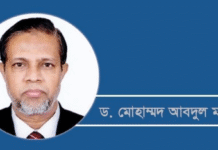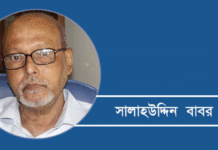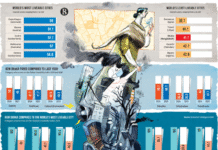
Educators in these columns have been asking for recovery and remedial actions to overcome the pandemic-induced learning losses that threaten a generational learning disaster. The problems regarding quality, equity and inclusion in education that existed before the pandemic have been magnified by its effects. A medium-term recovery and renewal plan for education has become urgent.
Twelve years ago, in April 2010, when a new Education Policy commissioned by the Awami League-led coalition government was about to be finalised, five of the most respected educators of Bangladesh put out a joint statement, spelling out a nine-point agenda for the renewal of Bangladesh’s education system. It was published in the media then.
The National Education Policy, 2010, adopted in December of that year, remains largely unimplemented. And the nine-point advice of the eminent educators remain highly relevant today. The five education gurus were: Prof Kabir Chowdhury, who headed the commission that prepared the 2010 policy; Prof Anisuzzaman, national professor; Prof Zillur Rahman Siddiqui, former vice-chancellor of Jahangirnagar University; Prof Jamal Nazrul Islam, director of the Research Centre for Mathematical and Physical Sciences at the Chittagong University; and Prof Serajul Islam Chowdhury, professor emeritus of Dhaka University. Among them, only Prof Sirajul Islam Chowdhury is still with us today.
The nine points, abridged and paraphrased from Bangla, are as follows:
1) To keep students and the youth away from ill-politics and to protect the academic environment on campus, the Awami League should sever its links with the Chhatra League. All heads of institutions and local administrations should be directed to strictly control criminal activities and rule-breaching by students; support from all levels of government should be assured for this purpose. This is essential to revive the glorious tradition of student politics.
2) The major goals of the education policy under preparation enjoy broad consensus. Subject to approval by parliament, steps should be taken to realise the broadly supported goals.
3) Among the important issues about which there is no debate include: a) A unified core curriculum for all students in primary and secondary education; b) All students should acquire basic competencies, including Bangla and English languages, maths, science, history, social studies, and information technology, and the outcomes should be assessed by applying scientific methods; c) Primary and secondary education management and planning should be meaningfully decentralised with the heads of institutions possessing the skills, capability and status to provide educational leadership.
4) A permanent education commission answerable to the parliament should be established to guide and oversee adapting and adjusting of the policy and to solve problems in the light of experience and emerging issues.
5) To fulfil the constitutional obligation regarding education, to define roles of the state and citizens, and to outline the management and financing principles, a national education law should be adopted. The permanent education commission can guide this work.
6) To mobilise adequate education resources, the budget allocation for education should be doubled from two percent of GDP within five years, and raised to six percent eventually as required by the international standards.
7) As a means of mobilising adequate education resources, an education surcharge should be introduced on all major taxes, as practised in some countries. In India, education surcharge of two percent, later increased to three percent, is deposited in a permanent basic education fund, which covers the national school lunch programme and other equity-promoting measures.
8) To invest public funds for education equitably, education budgets should be allocated on the basis of student population in each upazila. To fulfil the right to universal education up to at least Grade 8, coordinated and decentralised comprehensive planning covering state and no-state education services in each upazila should be undertaken.
9) Three specific actions should be included in the Sixth Five-Year Plan (2010-15): a) School meal in all schools to encourage a full school day; b) A 10-year plan to attract and retain the best talents in school teaching. It should include designing “education” as a “major” in the regular college degree course, with 100 colleges—at least one in each district—prepared to offer the education major, well-equipped with physical facilities and good teachers, and creating an education service corps for government and government-assisted schools with appropriate social status, remuneration, and career path; c) A nationwide network of lifelong youth/adult community learning centres should be set up to extend widely opportunities for literacy, IT, skill-upgrading for the informal economy, and learning for personal development. This should replace the ongoing conventional and ineffective adult literacy courses.
The nine-point agenda and the priorities indicated for the sixth FYP remain almost entirely valid now for the current eighth FYP and beyond—an indication of unimplemented plans and unfulfilled expectations. One amendment in the agenda now would be that the universal education plan for Grade 8 should be replaced by a plan for secondary education up to Grade 12. Anything less is not acceptable for an aspiring higher-middle-income country.
The eminent educators urged that short-sighted views and narrow political calculation should be shunned, since such calculations do not serve the country or the regime well. They believed that a good faith effort by the political decision-makers along the line proposed, reflecting an enlightened political calculation, would attract overwhelming public support.
Dr Manzoor Ahmed is professor emeritus at Brac University, chair of Bangladesh ECD Network, vice-chair of Campaign for Popular Education (CAMPE), and a member of the international advisory committee of the Yidan Education Prize Foundation.










